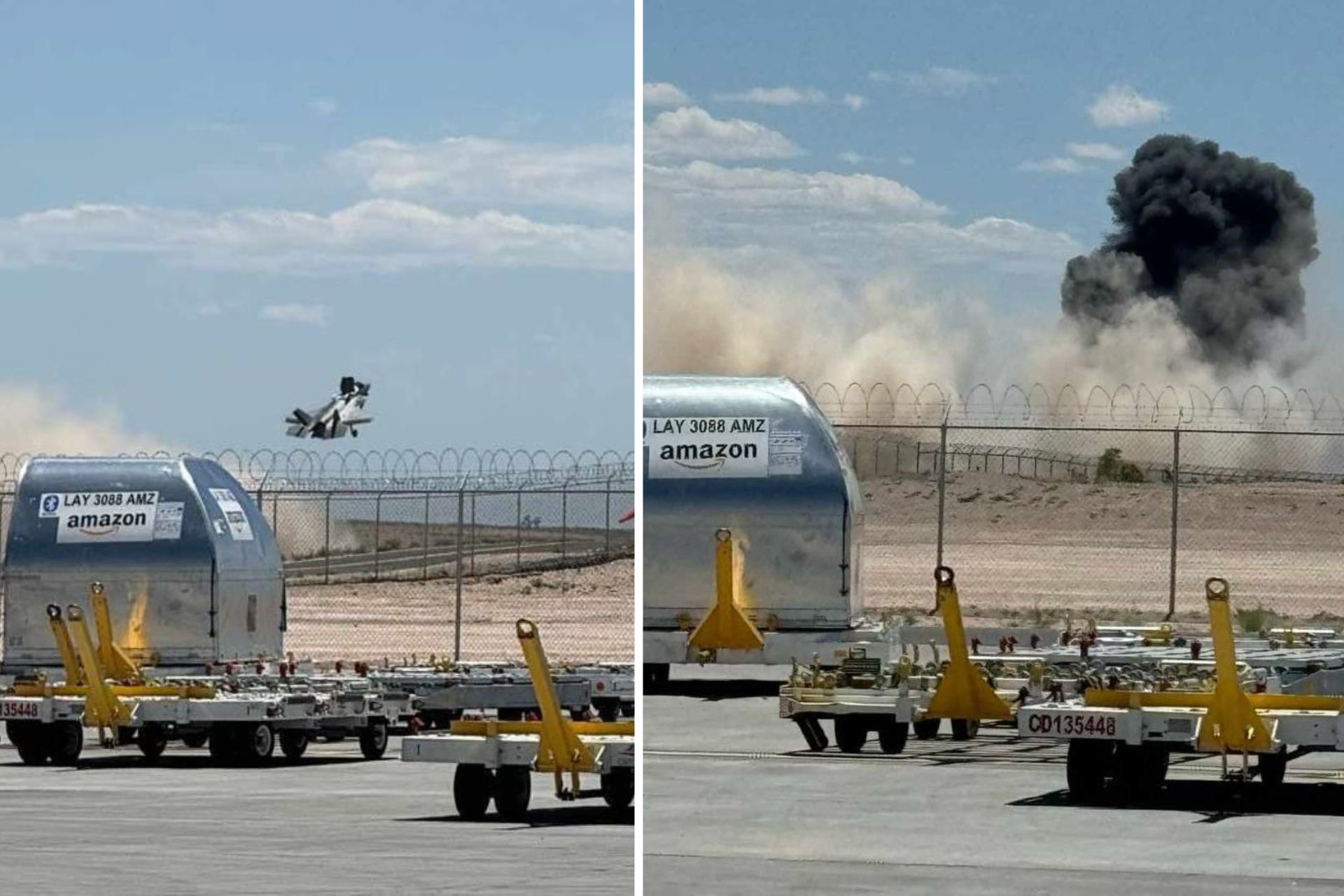USMC F-35 Crashes in New mexico kirkland airbase

{loadposition bannertop}
Breaking news
{loadposition sidebarpub}
A F-35 Joint Strike Fighter crashed outside Albuquerque International Sunport, which is located in the same area as Kirtland AFB in New Mexico, according to media reports and a video from the crash site. The pilot survived and was transported to a local hospital with serious injuries, firefighters reported.Follow Army Recognition on Google News at this link
google_ad_client = “pub-4068738923530102”;
/* 468×15 data sheet menu top dark green */
google_ad_slot = “3500417247”;
google_ad_width = 468;
google_ad_height = 15;
// ]]>
google_ad_client = “pub-4068738923530102”;
/* top_468x60_fiche_technique */
google_ad_slot = “2746785843”;
google_ad_width = 468;
google_ad_height = 60;
// ]]>
Moments Before and after the crash of USMC F-35 (Picture source: local civilians on X )
Lockheed Martin stated that the aircraft was a Marine Corps F-35, while Kirtland AFB initially claimed it was an Air Force fighter. After investigating the footage, it was confirmed that it was indeed a Marine Corps F-35. The aircraft was in transit between Texas and California.
The reason for this transit is unknown, but it appears that the incident occurred during takeoff after refueling at Kirtland AFB.
This crash marks the 13th incident involving an F-35 since the end of its testing phase in 2018. However, it was in 2020 that the F-35 reached maximum production capacity on the assembly lines. The majority of these crashes are due to mechanical issues, raising significant concerns about the reliability of this aircraft.
Built by Lockheed Martin, the F-35 comes in three technologically distinct variants. The F-35A and F-35C are quite similar, with the A being the standard version and the C being the naval version, featuring a larger wing and reinforced structure to withstand the stresses of landing and catapult launches. The F-35B, intended for the Marine Corps and the British Royal Navy, incorporates STOVL (Short Take-Off and Vertical Landing) technology. It was one of these that crashed on the morning of May 29.
Today, the F-35 is used by more than 15 countries worldwide, including Israel, Belgium, and Finland. The main argument for purchasing this aircraft in large numbers is its stealth capability. Its design reduces radar, infrared, acoustic, and visual signatures, allowing it to penetrate contested airspaces without being detected.
The F-35 has indeed been successfully sold and is widely used. However, serious design problems make it complex to use as the sole aircraft for an entire national fleet. The aircraft is intended to replace the F-16, F/A-18, and AV-8B Harrier by offering a unique multirole solution. Nevertheless, current usage has shown that the aircraft still has reliability issues, requiring significant development to improve responsiveness, payload capacity, interface fluidity, and interoperability.

{loadposition bannertop}
Breaking news
{loadposition sidebarpub}
A F-35 Joint Strike Fighter crashed outside Albuquerque International Sunport, which is located in the same area as Kirtland AFB in New Mexico, according to media reports and a video from the crash site. The pilot survived and was transported to a local hospital with serious injuries, firefighters reported.
Follow Army Recognition on Google News at this link
/* 468×15 data sheet menu top dark green */
google_ad_slot = “3500417247”;
google_ad_width = 468;
google_ad_height = 15;
// ]]>
/* top_468x60_fiche_technique */
google_ad_slot = “2746785843”;
google_ad_width = 468;
google_ad_height = 60;
// ]]>
Moments Before and after the crash of USMC F-35 (Picture source: local civilians on X )
Lockheed Martin stated that the aircraft was a Marine Corps F-35, while Kirtland AFB initially claimed it was an Air Force fighter. After investigating the footage, it was confirmed that it was indeed a Marine Corps F-35. The aircraft was in transit between Texas and California.
The reason for this transit is unknown, but it appears that the incident occurred during takeoff after refueling at Kirtland AFB.
This crash marks the 13th incident involving an F-35 since the end of its testing phase in 2018. However, it was in 2020 that the F-35 reached maximum production capacity on the assembly lines. The majority of these crashes are due to mechanical issues, raising significant concerns about the reliability of this aircraft.
Built by Lockheed Martin, the F-35 comes in three technologically distinct variants. The F-35A and F-35C are quite similar, with the A being the standard version and the C being the naval version, featuring a larger wing and reinforced structure to withstand the stresses of landing and catapult launches. The F-35B, intended for the Marine Corps and the British Royal Navy, incorporates STOVL (Short Take-Off and Vertical Landing) technology. It was one of these that crashed on the morning of May 29.
Today, the F-35 is used by more than 15 countries worldwide, including Israel, Belgium, and Finland. The main argument for purchasing this aircraft in large numbers is its stealth capability. Its design reduces radar, infrared, acoustic, and visual signatures, allowing it to penetrate contested airspaces without being detected.
The F-35 has indeed been successfully sold and is widely used. However, serious design problems make it complex to use as the sole aircraft for an entire national fleet. The aircraft is intended to replace the F-16, F/A-18, and AV-8B Harrier by offering a unique multirole solution. Nevertheless, current usage has shown that the aircraft still has reliability issues, requiring significant development to improve responsiveness, payload capacity, interface fluidity, and interoperability.




